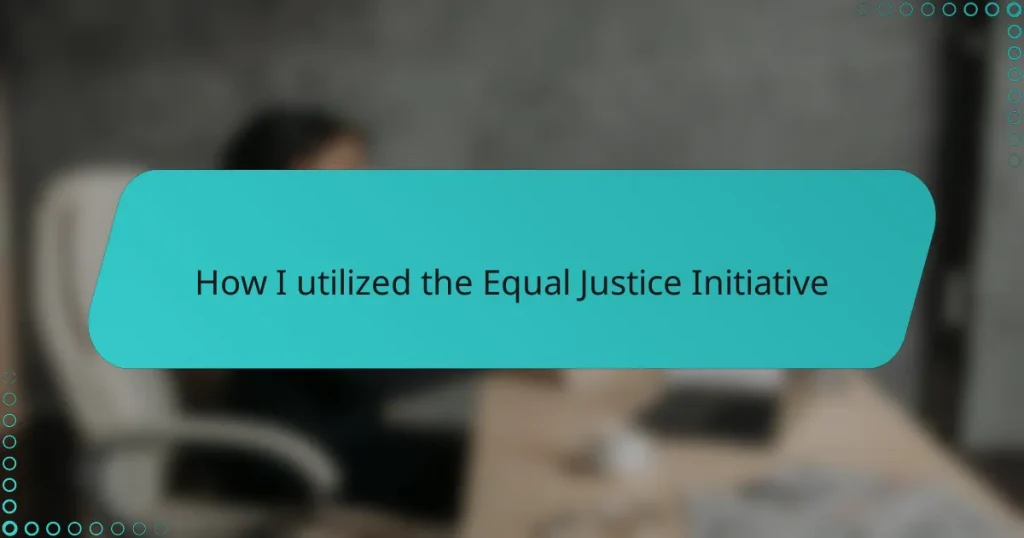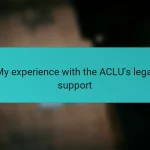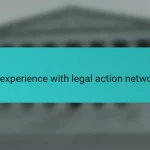Key takeaways
- Legal advocacy requires empathy, persistence, and a commitment to challenging systemic injustice, focusing on both individual rights and broader societal issues.
- The Equal Justice Initiative (EJI) not only provides legal representation but also addresses systemic problems like mass incarceration, emphasizing the importance of education and community engagement in promoting justice.
- Engaging with EJI resources fosters a deeper understanding of historical and social contexts that inform legal advocacy, urging advocates to prioritize empathy and collective action.
- Collaboration with EJI highlights the need for resilience in advocacy, underlining that progress may be slow but is essential in confronting injustices within the legal system.
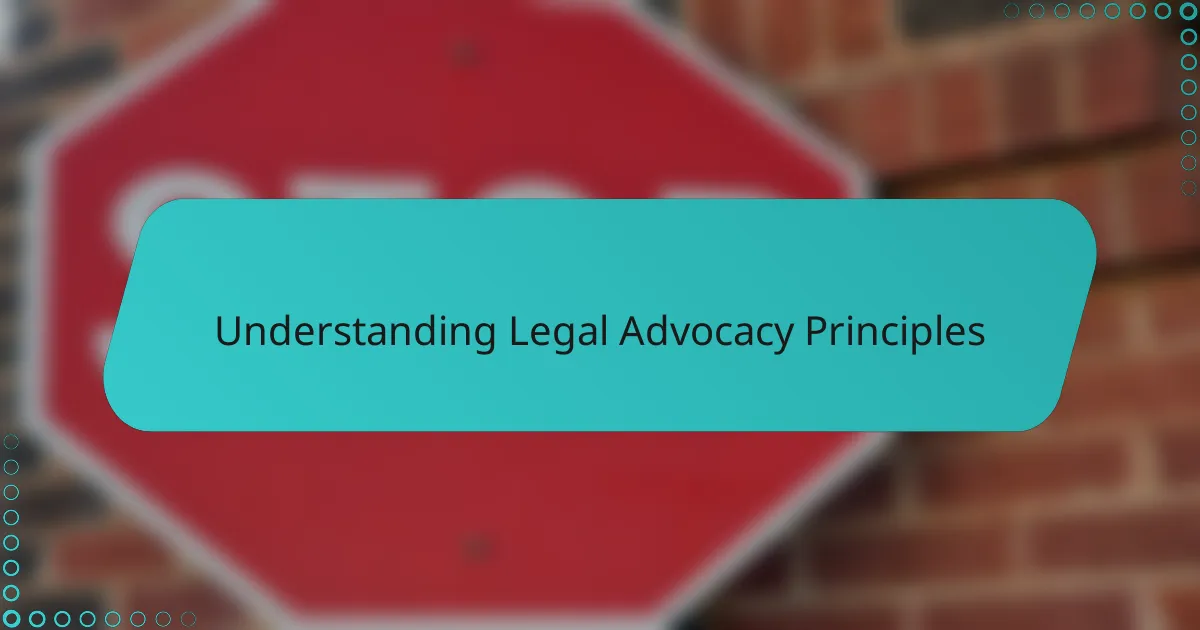
Understanding Legal Advocacy Principles
Legal advocacy, at its core, is about standing up for those who often lack a voice. I’ve learned that understanding its principles means recognizing justice isn’t just a concept—it’s a commitment to fairness and equity in every case. Have you ever considered how much of advocacy is really about listening first, before speaking?
In my experience, effective legal advocacy requires more than just knowing the law; it demands empathy and persistence. I recall moments when simply believing in a client’s story made all the difference, even when the odds were stacked against us. This human element is what transforms legal work from a profession into a profound mission.
What does justice truly mean in practice? For me, legal advocacy means using every tool available to challenge injustice, no matter how complex. It’s a delicate balance between understanding legal frameworks and fighting passionately for individual rights—an art that involves both knowledge and heart.
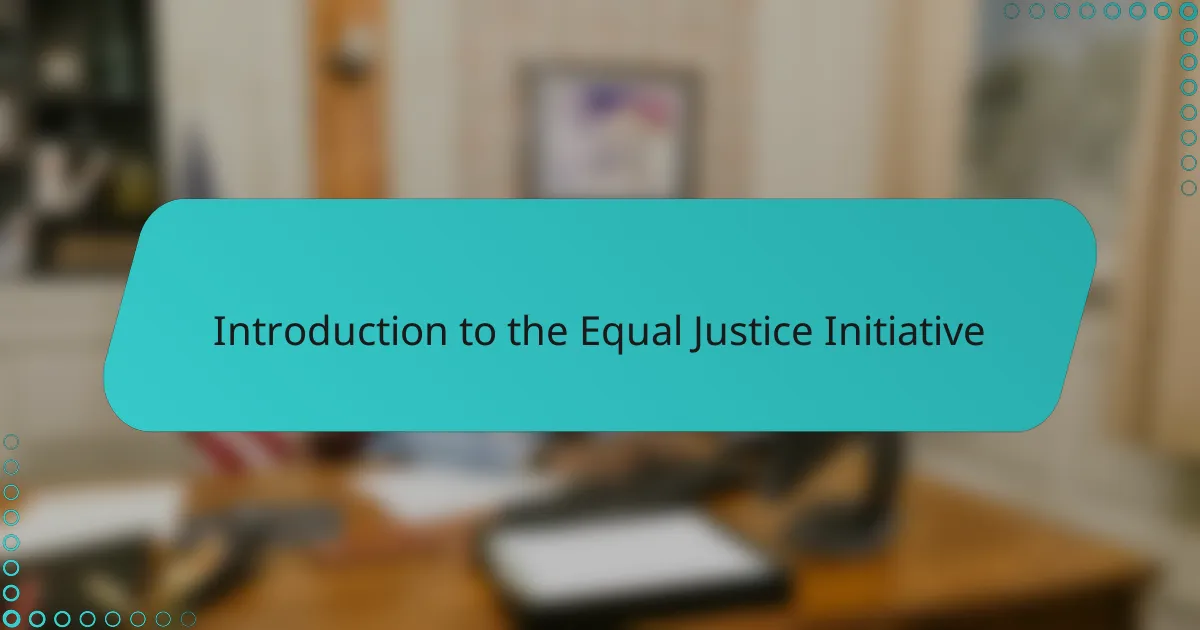
Introduction to the Equal Justice Initiative
The Equal Justice Initiative (EJI) is more than just an organization; it’s a beacon for those fighting the uneven scales of justice. When I first learned about EJI, I was struck by its mission to challenge racial inequality and protect the most vulnerable—a mission that resonated deeply with my own values in legal advocacy. Have you ever encountered a cause that instantly felt like a call to action? That’s how I felt discovering EJI’s work.
What sets EJI apart is its holistic approach—it doesn’t just handle cases, it confronts systemic issues like mass incarceration and unfair sentencing. I remember reading about their efforts to exonerate wrongfully convicted individuals; those stories reminded me why staying committed to justice matters, even when the system seems stacked against fairness. It made me question: How often do we, as advocates, look beyond individual cases to the bigger picture?
From my experience, engaging with EJI means embracing both hope and hard truths. Their dedication to education, reform, and remembrance pushes us to reflect on the roots of injustice while providing practical support to those affected. Working alongside or learning from EJI isn’t just legal work—it’s a profound human journey that challenges you to rethink what justice really means in today’s world.
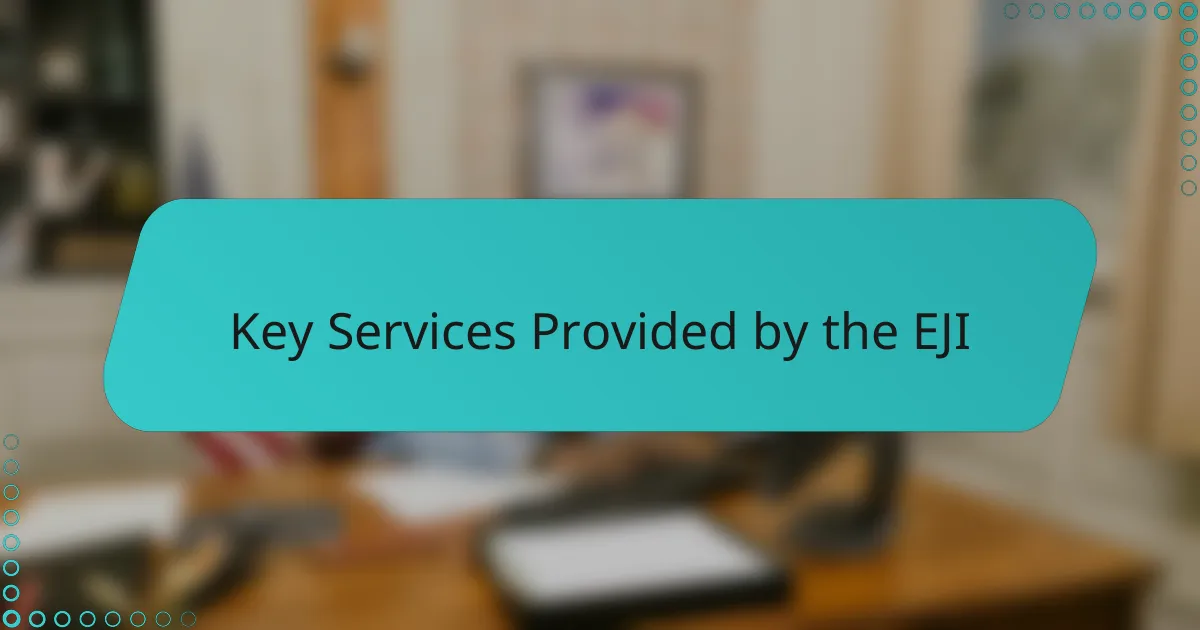
Key Services Provided by the EJI
One of the key services EJI provides is direct legal representation for individuals facing wrongful convictions, especially those sentenced to death. I remember reading a case where EJI’s team meticulously reviewed decades-old evidence and helped free someone who had been trapped behind bars for years. It made me wonder: how many lives remain unjustly confined simply because no one dared to look deeper?
Beyond courtroom battles, EJI offers educational programs that challenge the history and realities of racial injustice. I’ve found these resources eye-opening—like when I first engaged with their materials, it shifted my understanding of systemic bias in profound ways. Can education alone reshape our legal system? EJI believes it can, by changing minds and inspiring action.
EJI also dedicates significant efforts to community outreach and memorial projects, such as documenting lynching survivors and preserving sites of racial violence. These initiatives struck a chord with me because they remind us that justice isn’t only about laws—it’s about acknowledging pain and healing wounds. I often ask myself: how can legal advocates foster true societal change without addressing these deep-rooted scars?
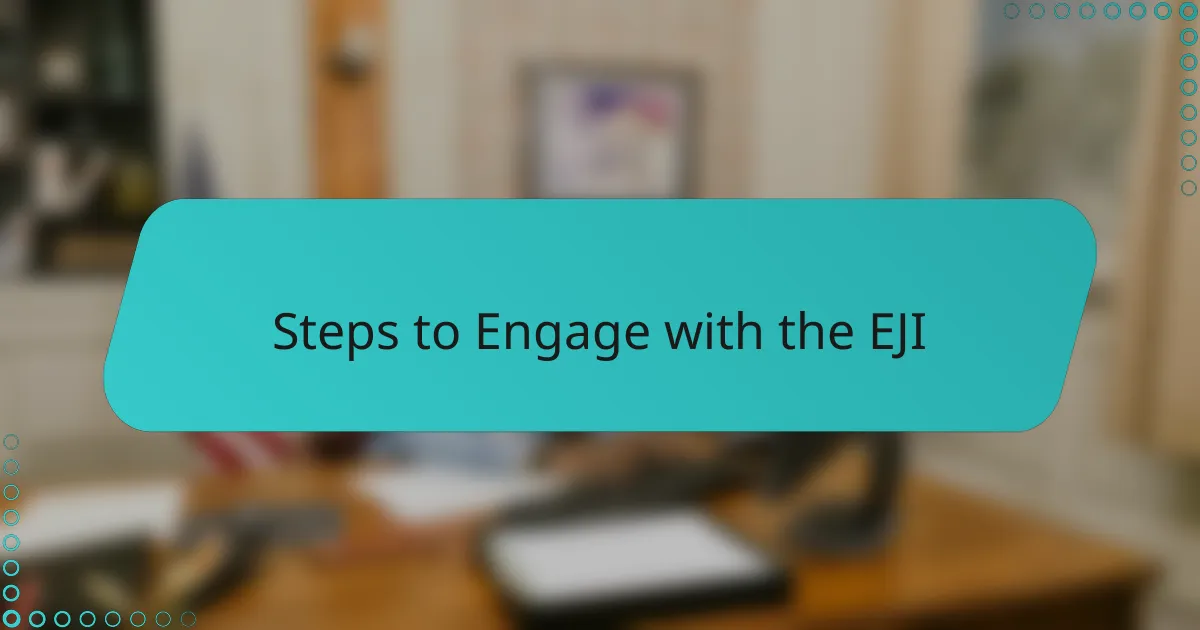
Steps to Engage with the EJI
The first step I took to engage with the Equal Justice Initiative was to explore their website and resources deeply. It felt like opening a door to a world of stories and legal battles I hadn’t fully grasped before. Have you ever found yourself drawn in by something so compelling that you just had to learn more? That was me, scrolling through their case histories and educational materials late into the night.
Next, I reached out to EJI through their volunteer and internship programs. This wasn’t just about lending a hand; it became a way to immerse myself in real-world advocacy alongside seasoned professionals. I vividly remember the nervous excitement before my first call with an EJI legal team—would I be able to contribute meaningfully? That moment taught me how much engagement requires both courage and humility.
Finally, I participated in their public events and training sessions. These gatherings are more than learning opportunities—they’re spaces where you connect with others who share a fierce commitment to justice. It made me think: how often do we underestimate the power of community in sustaining long-term change? Joining EJI showed me that advocacy thrives when it’s rooted in collective effort and shared vision.
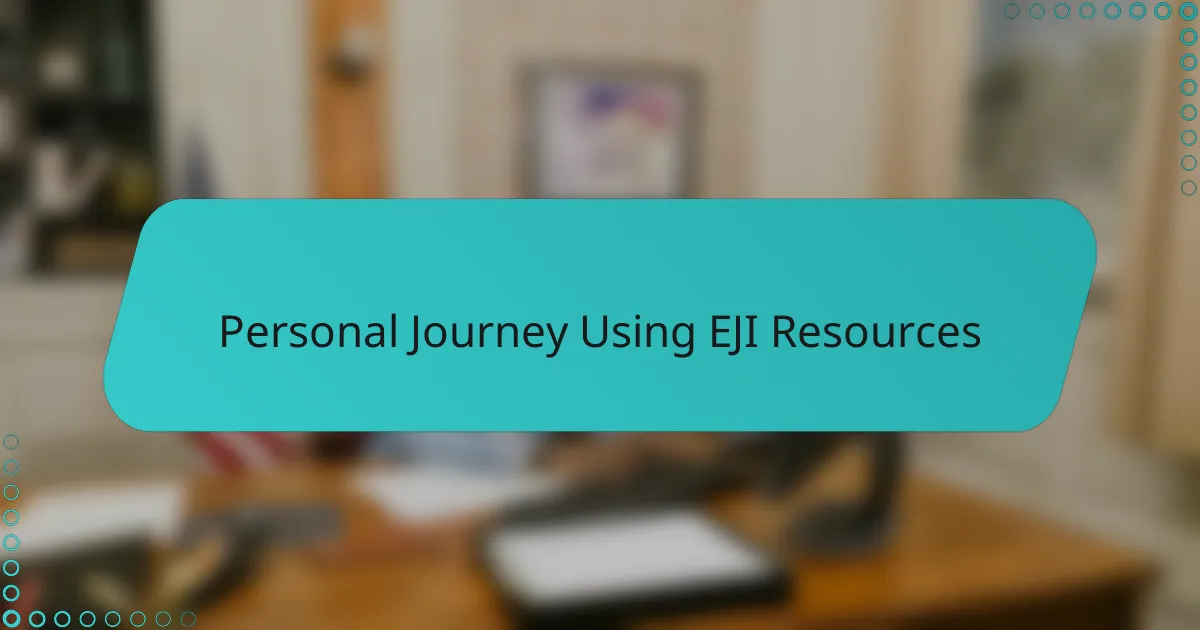
Personal Journey Using EJI Resources
When I first used EJI’s resources, I was overwhelmed by the depth of history and human stories they shared. Diving into their databases and reports felt like walking alongside those whose voices had too long been silenced. Have you ever encountered a resource that didn’t just inform you but moved you to reflect on your own role in the fight for justice? For me, EJI did exactly that.
One moment that stands out was studying a case where EJI helped overturn a wrongful conviction after decades of wrongful imprisonment. Reading about that victory wasn’t just inspiring—it was a powerful reminder of the legal system’s flaws and the critical importance of perseverance. I found myself asking: What more can I do through advocacy to prevent these injustices from continuing?
Engaging with EJI’s educational programs reshaped how I approach legal advocacy on a personal level. Their materials challenged me to think beyond the courtroom and understand the social and historical contexts that fuel systemic inequities. This journey has made me realize that true legal advocacy is as much about learning and empathy as it is about winning cases.
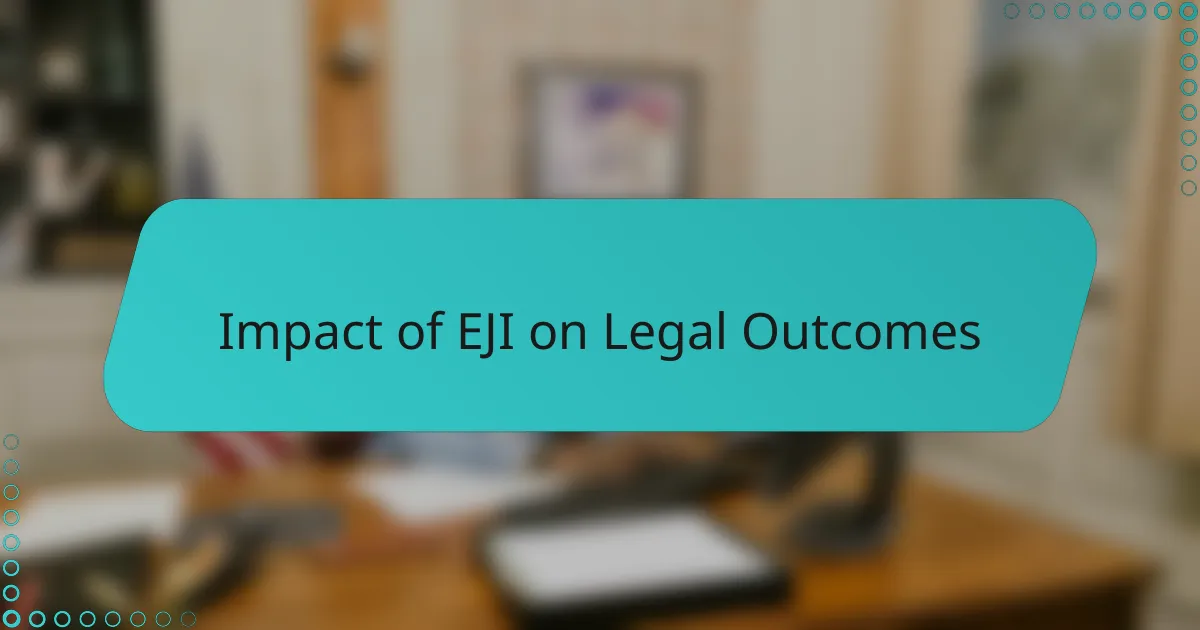
Impact of EJI on Legal Outcomes
The impact of the Equal Justice Initiative on legal outcomes has been profound in my experience. One case that stays with me involved EJI’s relentless pursuit to overturn a wrongful conviction; seeing justice finally prevail after years of unfair imprisonment reminded me just how critical their role is in changing lives. Have you ever witnessed a victory that felt bigger than a single client, one that challenged the entire system’s failures? That’s the power EJI wields.
What’s remarkable is how EJI’s work doesn’t just stop at courtroom wins. Their influence extends to reshaping sentencing practices and exposing racial biases that often skew legal decisions. From what I’ve seen, this ripple effect leads to fairer outcomes—not just for the individual but for entire communities historically marginalized by the justice system. It made me think: how much legal advocacy could improve if more lawyers embraced EJI’s comprehensive approach?
Reflecting on my own journey, using EJI’s resources helped me approach cases with a renewed sense of purpose. The stories they uncover and the systemic injustices they highlight compelled me to look deeper at every client’s background. Isn’t that the essence of impactful advocacy—knowing that each legal outcome is tied to a larger fight for equity? This perspective shift has been, for me, one of EJI’s most powerful contributions to legal practice.
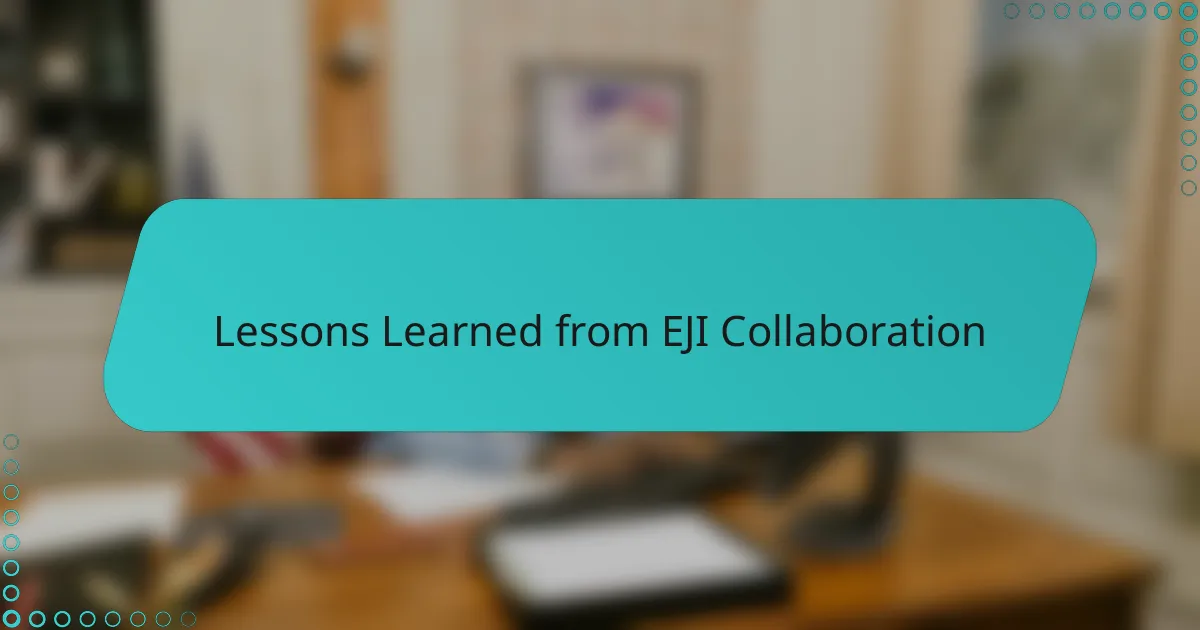
Lessons Learned from EJI Collaboration
Collaborating with EJI taught me that legal advocacy isn’t just about individual victories—it’s about embracing a lifelong commitment to confronting systemic injustice. I remember feeling humbled watching their devotion to cases that stretched far beyond the courtroom; it made me question how often I might have focused too narrowly on legal technicalities instead of the broader fight for justice.
Another lesson I took away is the importance of resilience and patience. Working alongside EJI, I saw firsthand how progress can be painstakingly slow, yet every effort matters. Have you ever had to trust a process that demanded persistence when immediate results seemed impossible? That experience deepened my respect for advocates who keep pushing forward despite overwhelming challenges.
Finally, I learned how crucial it is to integrate education and empathy into legal work. EJI’s method of combining storytelling with hard legal facts reminded me that behind every case there’s a human being whose dignity we must honor. This fusion reshaped how I approach my advocacy, making me more mindful that justice is not only won through law but through understanding and connection.
